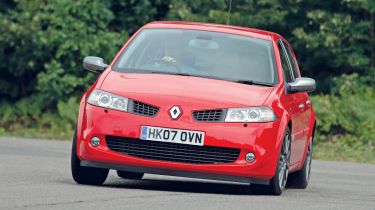Renaultsport Megane
Renaultsport Megane dCi 175 offers comfort and waves of torque, pity it's too pricey

The Mégane has always looked at its sharpest in Renaultsport guise, but only now can you get the styling with frugal economy. Yet while the diesel variant brings gutsy performance and low running costs to the line-up, it’s held back by its price. In Lux trim, the dCi is too expensive compared to class-leading petrol hot hatchbacks.
Not all hot hatch fans are as dedicated as those who love the Renaultsport brand. Its models, based on the Clio and Mégane, inspire loyalty on a level that not even Volkswagen’s latest Golf GTI can match.
So, you can understand Renault’s reluctance to upset these customers – and as a result, it has taken years for the manufacturer to add the coveted badge to a car with diesel power. The 2.0-litre Mégane dCi changes all that – but the question is, will it be accepted into the Renaultsport elite?
Spotting the 173bhp newcomer will take a well trained eye. Designers have been careful to ensure that the diesel looks as good as its petrol brother. Even the central exhaust pipes – a Renaultsport trademark – have been adapted, and the only tell-tale sign on the outside is the removal of the roof spoiler.
Inside, it’s equally difficult to distinguish what’s in the tank – until you look at the rev counter. While the petrol version is keen to race towards a screaming red line, the oil-burner delivers its 360Nm peak torque output at 2,000rpm, and maximum power comes in at 3,750rpm.
Elsewhere in the cabin, the diesel offers all the comfort and sportiness of the petrol models. While the dashboard design is beginning to look a bit dated, supportive bucket seats help to hold the driver and front passenger in place when cornering.
The five-door dCi completes the sprint from 0-62mph in 8.5 seconds, but off the line it doesn’t feel like a hot hatch. Only in higher gears does the diesel unit’s versatility begin to pay off, with waves of torque thrusting the Mégane forwards. In fact, Renault claims that the oil-burner is one second quicker than the 222bhp petrol version when accelerating from 50-70mph.
Used - available now

2024 Volkswagen
Golf GTD
50,588 milesAutomaticDiesel2.0L
Cash £21,172
2021 BMW
X3
25,580 milesAutomaticDiesel3.0L
Cash £37,249
2020 Ford
Kuga
28,774 milesManualDiesel2.0L
Cash £18,649
2020 Suzuki
SX4 S-Cross
38,868 milesManualPetrol1.4L
Cash £10,849Even though it looks virtually identical, engineers have done much more than simply drop a diesel engine into the hot hatch. They have also updated the stiffness of the springs and the damper settings specifically for the dCi. Not only does this allow for the extra weight of the powerplant, it also puts greater emphasis on long-distance cruising comfort.
These changes are all very well, but they have diluted the Mégane’s driving experience. The handling simply isn’t as responsive as the petrol model’s. The trade-off is a more pliant ride, although the Renault’s motorway abilities are still put to shame by the likes of the Ford Focus and Honda Civic, both of which glide over rough surfaces with greater comfort.
However, drivers who demand polished handling above all else will also be able to specify the much stiffer Cup suspension pack for their car. With 37 per cent firmer springs and a unique damper set-up, this model should blend the sharpest handling with the lowest fuel consumption.
Indeed, with combined economy of 43.5mpg, the oil-burner opens up the racy Renault range to cost-conscious high-mileage drivers for the first time. It also sits five insurance groups lower than the petrol model.
So, Renaultsport’s first-ever diesel has the breadth of abilities we would expect. The trouble is, few true hot hatch fans will be willing to pay a premium for derv power. The Mégane dCi costs £490 more than the petrol variant; when you consider the trade-off in terms of performance and handling, it would have been much easier to justify had it been cheaper.
Although the standard dCi 175 weighs in at £19,450, the Lux variant we drove breaks the £20,000 barrier. True, it’s very well equipped, but overlooking the high-performance range-topper – the 230 F1 Team R26, priced £19,860 – is asking too much.






